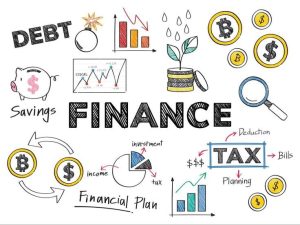Is Banking and Finance the Same? Understanding the Basics
Is Banking and Finance the Same?
The financial world can be a complex web of terms, and “banking” and “finance” are often used interchangeably. While they are certainly connected, there are key differences in their scope and function. Let’s untangle the threads and see how banking and finance fit together in the grand scheme of managing money.
Understanding the Basics
In the intricate world of finance, the terms “banking” and “finance” often get tossed around interchangeably, but they hold nuanced distinctions. While both aim to navigate the currents of monetary flows, they do so through different avenues within the financial landscape.
The Role of Banking
Functions of Banks
Banks stand as the stalwarts of financial intermediation, bridging the gap between those with surplus funds and those in need. Their services span a wide spectrum, from providing a haven for deposits to extending loans and facilitating investments, all the while catering to the needs of individuals and enterprises alike. Also, read about The difference between finance and accounts
Exploring Finance
Definition and Scope
Finance casts a broader net, encompassing the art and science of managing money in all its forms. It traverses through various realms, including but not limited to investment management, risk assessment, and financial planning, with implications reaching both personal and corporate finance domains.
Key Differences Between Banking and Finance
Conceptual Differences
At its core, banking revolves around the mobilization of funds, primarily through deposit-taking and lending activities. Conversely, finance casts a wider net, encapsulating the strategic orchestration of capital, investment decisions, and risk mitigation strategies.
Operational Differences
While banks navigate the regulatory labyrinth, adhering to stringent frameworks to maintain liquidity and ensure stability, finance operates on a different axis altogether. It’s a realm characterized by strategic decision-making, asset optimization, and the allocation of capital resources for optimal returns. Discover more about What is CEO and COO

Overlapping Areas
Interconnectedness of Banking and Finance
Despite their discrete domains, banking and finance often find themselves intertwined, especially in the realms of investment banking. Here, financial institutions play a multifaceted role, offering services ranging from underwriting and advisory to securities trading, thereby blurring the lines between the two domains.
Synergies and Collaborations
Recognizing the complementary nature of their functions, banks and finance entities frequently join forces to provide holistic financial solutions. This symbiosis not only fosters innovation but also enhances the efficiency and effectiveness of financial services, ultimately benefiting end-users.
Career Paths in Banking and Finance
Opportunities in the Banking Sector
Careers in banking present a myriad of pathways, catering to diverse interests and skill sets. From front-facing roles in retail banking to the complexities of investment banking and the intricacies of risk management, the sector offers avenues for growth and specialization.
Careers in the Finance Sector
Similarly, the finance sector boasts a rich tapestry of career opportunities, ranging from financial analysis and portfolio management to corporate finance and treasury operations. Professionals in this domain are tasked with navigating the intricacies of financial markets, leveraging data and insights to drive informed decisions.
Education and Skill Requirements
Qualifications for Banking Jobs
Securing a foothold in the banking sector often necessitates a solid educational foundation, typically in the form of a bachelor’s degree in finance, accounting, or economics. Additionally, certifications such as the Chartered Financial Analyst (CFA) or Certified Financial Planner (CFP) serve as valuable assets, signaling proficiency and dedication to the craft.
Skill Set for Finance Careers
In the dynamic landscape of finance, technical prowess must be complemented by a suite of soft skills. Critical thinking, effective communication, and problem-solving abilities are paramount, alongside a knack for data analysis and an appetite for continuous learning to stay abreast of evolving trends and technologies.

Future Trends and Innovations
Technological Advancements in Banking
The winds of change are sweeping through the banking sector, driven by an onslaught of technological innovations. From the proliferation of digital banking platforms to the adoption of blockchain and artificial intelligence, these advancements promise to revolutionize operational processes, enhance customer experiences, and fortify cybersecurity measures.
Innovations in the Financial Sector
Finance, too, is undergoing a seismic shift, propelled by the rise of fintech and decentralized finance (DeFi). These disruptive technologies are reshaping traditional financial services, democratizing access to capital markets, and empowering individuals to take control of their financial destinies.
Conclusion
In essence, while banking and finance share common ground, they diverge in scope, functions, and operational frameworks. Understanding the nuances between the two is paramount for individuals navigating the labyrinth of financial careers. Moreover, by fostering collaboration and synergy, we can harness the collective potential of banking and finance to drive innovation and shape the future of the financial landscape.
FAQs
Are banking and finance the same thing?
No, while closely related, banking and finance have distinct roles and functions within the financial ecosystem. Banking focuses on intermediating funds, whereas finance encompasses a broader scope, including investment management and financial planning.
What are some examples of services offered by banks?
Banks provide a range of services, including deposit-taking, lending, investment management, and financial advisory. They also offer products like savings accounts, loans, mortgages, and investment opportunities.
What qualifications are necessary for a career in banking?
To pursue a career in banking, individuals typically need a bachelor’s degree in finance, accounting, economics, or a related field. Additionally, certifications such as the Chartered Financial Analyst (CFA) or Certified Financial Planner (CFP) can enhance job prospects.
How do technological advancements impact the banking and finance sectors?
Technological innovations such as digital banking, blockchain, and artificial intelligence are revolutionizing both banking and finance. These advancements improve operational efficiency, enhance customer experiences, and enable new financial services and products.
What are some emerging trends in the financial industry?
Emerging trends in finance include the rise of fintech (financial technology) startups, the growth of decentralized finance (DeFi), increasing focus on sustainable investing, and the integration of AI and machine learning in financial decision-making processes.
